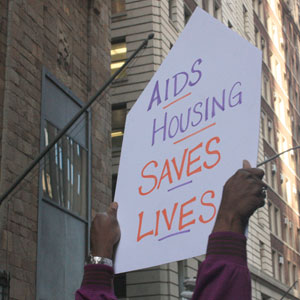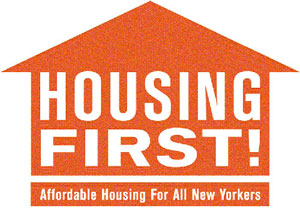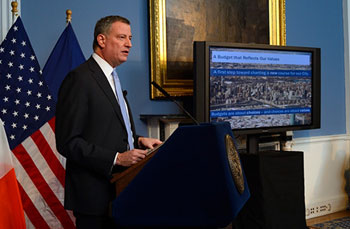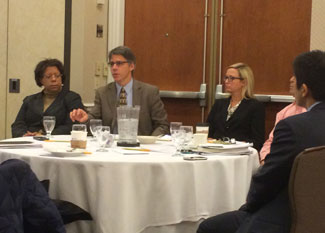

Showing Posts by Date: 02/2014
02.27.2014
 The Network has released a new report on the New York/New York III Supportive Housing Agreement, the landmark 2005 commitment to create 9,000 new units of supportive housing in 10 years.
The Network has released a new report on the New York/New York III Supportive Housing Agreement, the landmark 2005 commitment to create 9,000 new units of supportive housing in 10 years.
The report, available here, synthesizes findings from interviews with more than 140 members of the supportive housing community. Taking Stock of the New York/New York III Supportive Housing Agreement: A Community View of the Achievements and Challenges of Implementing the Nation's Largest Supportive Housing Initiative offers an in-depth look at the initiative and explores key areas for growth and improvement for the next great partnership between New York City and State to end homelessness.
"Taking Stock confirms what many of us have known for years: That the New York/New York III Agreement has been a phenomenal engine to house formerly homeless New Yorkers," says Network Executive Director Ted Houghton. "We hope this report will serve as an aid to the supportive housing community, our government partners and other stakeholders as we seek to build upon NY/NY III with a successor agreement. After more than 30 interviews and seven focus groups, we're confident in calling NY/NY III a resounding public policy success."
The Network interviewed an array of stakeholders for this project, including representatives from all 10 of the government signatories of the agreement, supportive housing and shelter providers, NY/NY III tenants, advocates and private sector partners. The goal of the project was to provide a platform for this diverse group of stakeholders to offer feedback on the successes and challenges of the initiative and to elicit their guidance on how best to design future supportive housing agreements.
Continue Reading …02.24.2014
 Advocates from the HIV/AIDS and supportive housing communities are celebrating a long-awaited policy victory in New York City.
Advocates from the HIV/AIDS and supportive housing communities are celebrating a long-awaited policy victory in New York City.
Last week, Gov Andrew Cuomo released his 30-day amendments for the 2014-2015 fiscal year budget. The amendments include new language to fix a rental assistance program for people living with HIV/AIDS in New York City. The governor proposes to place a cap on the amount of money these individuals must pay in rent. Under the amendment, tenants with HIV/AIDS can be charged no more than 30% of their annual income in rent.
This rent cap – advocated for years by our friends at VOCAL, Housing Works and other allies – represents a major victory for low-income and formerly homeless individuals living with HIV/AIDS in NYC. NYC is home to 12,000 individuals with HIV/AIDS, many of whom pay up to 70 percent of their disability income toward rent.
The 30-day amendment comes on the heels of NYC Mayor Bill de Blasio’s budget proposal earlier this month, which also included a 30% rent cap for HIV/AIDS tenants. New York City will pay for roughly $17 million, or 70 percent of the costs associated with this partnership; New York State will pay for the remaining 30 percent, or $9 million.
This policy fix will help prevent thousands of low-income New Yorkers from becoming homeless. We congratulate Housing Works, VOCAL and all our partners who’ve been on the front lines of this issue for years, and we applaud Mayor de Blasio and Gov. Cuomo for their action!
For a press release on all the governor’s 30-day amendments, see here.
| New York State, New York City02.19.2014
 Two Network leaders published a letter to the editor in the New York Times last Friday. Their piece, posted here, responds to a February 7 editorial on the lack of affordable housing options in New York City. The letter was written by Network Executive Director Ted Houghton and Board Member Todd Gomez. Mr. Houghton and Mr. Gomez are also the co-Chairs of the Housing First! coalition.
Two Network leaders published a letter to the editor in the New York Times last Friday. Their piece, posted here, responds to a February 7 editorial on the lack of affordable housing options in New York City. The letter was written by Network Executive Director Ted Houghton and Board Member Todd Gomez. Mr. Houghton and Mr. Gomez are also the co-Chairs of the Housing First! coalition.
In their NYT letter to the editor, Mr. Houghton and Mr. Gomez encourage Mayor Bill de Blasio to act quickly to reach his administration’s goal of creating 200,000 units of affordable housing in the next 10 years.
“The plan’s success will serve as a national model for other cities facing similar affordability challenges,” they write. “With so much to gain, there’s no time to lose.”
Housing First! also released a policy brief on the mayor’s housing plan earlier this month. If you haven’t already, we urge you to read and share Building Stronger, the Housing First! coalition’s detailed policy guide on affordable housing and the new administration.
| New York City02.14.2014
![]() In New York City, 70 homeless families will soon have access to housing and support services thanks to a funding announcement made yesterday by Gov. Andrew Cuomo.
In New York City, 70 homeless families will soon have access to housing and support services thanks to a funding announcement made yesterday by Gov. Andrew Cuomo.
The State will award $1.75 million to five supportive housing nonprofits scattered across NYC. All five nonprofit providers are members of the Supportive Housing Network: Fortune Society, Odyssey House, Project Hospitality, Samaritan Village and Women In Need. This funding will support the creation of 70 units of supportive housing for homeless families struggling with an addiction to drugs or alcohol.
“Supportive housing programs are essential to breaking the cycle of homelessness for New York’s most vulnerable individuals and families,” said Gov. Cuomo. “These programs provide the vital support services necessary to help families maintain physical and emotional health, sustain healthy relationships and generally improve the overall quality of their lives.”
These funds are available through the NYS Office of Alcoholism and Substance Abuse Services (OASAS). They mark the latest round of funding through the New York/New York III Supportive Housing Agreement, a ten-year partnership between New York City and State to create 9,000 new units of supportive housing.
Continue Reading … | Funding, New York State, New York City02.13.2014
 NYC Mayor Bill de Blasio released his first preliminary budget yesterday. The document, available here, includes no major cuts and new funding in a few targeted priority areas, including housing and homelessness.
NYC Mayor Bill de Blasio released his first preliminary budget yesterday. The document, available here, includes no major cuts and new funding in a few targeted priority areas, including housing and homelessness.
Delivering on a campaign promise, the mayor joined Governor Andrew Cuomo to cap the maximum contribution tenants receiving rent subsidies from the HIV/AIDS Services Administration (HASA) must pay toward rent. The new budget allocates $4.3 million in fiscal year 2014 and $17.4 in FY 2015 to cap the rent contribution for HIV/AIDS housing clients at 30 percent. The state is picking up one-third of the cost.
The mayor also indicated that he is talking with the governor about a homelessness prevention pilot, which will fund rental assistance and anti-eviction legal services, among other prevention services. The budget contains no additional information, but there will be an announcement in the future.
The mayor also announced new funding for homeless and runaway youth. His budget provides $1.3 million in FY 2014 and $2.4 million in FY 2015 to add 76 shelter beds for the city’s homeless and runaway youth. He said services will include “emergency housing, food, clothing, individual and group housing, and limited transportation services.”
Continue Reading … | New York City02.10.2014
{main_body:excerpt} |02.03.2014
 The Network participated in a kick-off planning meeting last month for the Housing Is Healthcare Coalition, a new nationwide campaign to fund supportive housing programs using federal Medicaid funding. This advocacy effort aims to convince federal policymakers of the fiscal and quality-of-life benefits of supportive housing for individuals who are high-cost Medicaid users. As members of the supportive housing community have long argued, housing and support services can have tremendous health benefits for formerly homeless individuals and other vulnerable populations. Studies have shown that supportive housing can lead to fewer emergency room visits, fewer nights at the hospital and greater overall health for people living with HIV/AIDS and other medically frail homeless individuals.
The Network participated in a kick-off planning meeting last month for the Housing Is Healthcare Coalition, a new nationwide campaign to fund supportive housing programs using federal Medicaid funding. This advocacy effort aims to convince federal policymakers of the fiscal and quality-of-life benefits of supportive housing for individuals who are high-cost Medicaid users. As members of the supportive housing community have long argued, housing and support services can have tremendous health benefits for formerly homeless individuals and other vulnerable populations. Studies have shown that supportive housing can lead to fewer emergency room visits, fewer nights at the hospital and greater overall health for people living with HIV/AIDS and other medically frail homeless individuals.
Four strategies emerged from last month’s meeting to persuade lawmakers to recognize the healthcare benefits of housing. These strategies include: